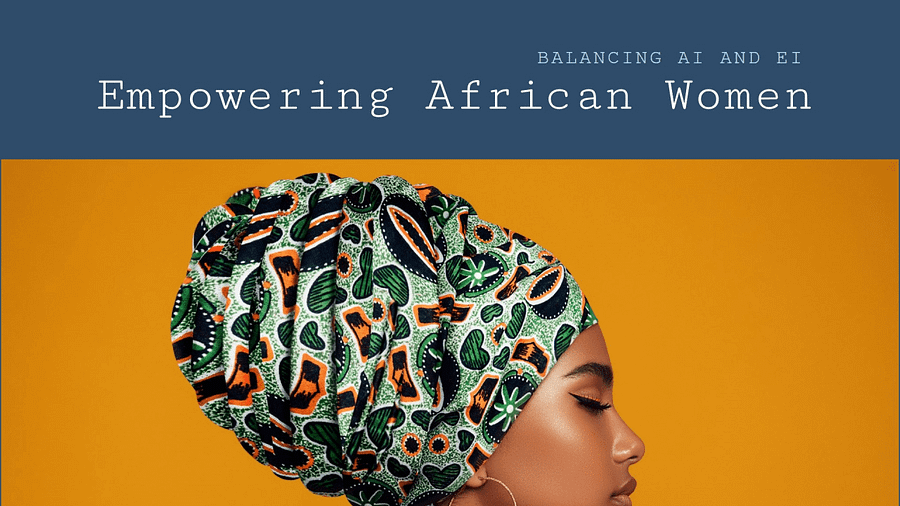
In the rapidly evolving digital landscape, Artificial Intelligence (AI) is often hailed as the future of efficiency, innovation, and growth. Yet, as we integrate AI into various facets of life and work, the importance of Emotional Intelligence (EI) becomes increasingly evident. While AI offers tools for automating tasks and analyzing data, EI provides the empathy, understanding, and human connection that technology alone cannot achieve. For African women, mastering the intersection of AI and EI is not just an opportunity but a necessity to lead and excel in the digital economy.
Emotional Intelligence (EI):
At its core, Emotional Intelligence is the ability to understand and manage emotions—both our own and those of others. It encompasses self-awareness, empathy, and social skills, which are critical for leadership and interpersonal relationships. In many African societies, where communal relationships and social cohesion are central, EI is not just a soft skill but a fundamental aspect of effective leadership and community building.
Artificial Intelligence (AI):
Artificial Intelligence, on the other hand, involves the use of technologies like machine learning, robotics, and natural language processing to perform tasks that would typically require human intelligence. Across Africa, AI is being increasingly adopted in sectors ranging from healthcare to finance, offering new avenues for growth and development. However, without the guiding hand of EI, these technologies risk becoming disconnected from the human needs they are meant to address.
The intersection of AI and EI presents a powerful framework for enhancing decision-making, leadership, and inclusivity in the digital economy. By combining AI’s data-driven insights with EI’s empathetic understanding, African women can navigate the complexities of modern business and community life with greater effectiveness.
Enhancing Decision-Making:
One of the key areas where the integration of AI and EI can be particularly impactful is in decision-making. AI provides the ability to analyze vast amounts of data quickly, offering insights that can guide strategic decisions. However, it is EI that allows individuals to interpret these insights within the context of human emotions and relationships. For African women entrepreneurs, this combination means they can use AI to identify market trends and opportunities while applying EI to understand their customers’ needs and cultural nuances, leading to more effective and sustainable business strategies.
Leadership and Management:
In leadership roles, the blend of AI and EI can create a balanced approach to managing teams and organizations. AI can streamline operations and provide analytics that informs decision-making, while EI ensures that leaders remain attuned to the emotional well-being of their teams. For African women, who often juggle multiple responsibilities, integrating these two elements can foster a work environment that is both efficient and supportive, ultimately driving long-term success.
Bridging the Gender Gap:
Perhaps one of the most promising aspects of the AI and EI intersection is its potential to bridge the gender gap. AI has the power to democratize access to resources such as education, finance, and entrepreneurial opportunities. However, to ensure these resources are accessible and equitable, EI must guide the implementation of AI, making sure it addresses the unique challenges faced by African women due to cultural and societal norms. By harnessing both AI and EI, African women can overcome these barriers and create opportunities that are sensitive to their needs and aspirations.
To truly empower African women in the digital age, it is essential to execute this framework by focusing on education, policy, and community building.
Education and Training:
Empowerment begins with education. It is crucial to invest in educational initiatives that combine the development of both technical skills and emotional intelligence. Practical training in AI should be paired with courses that foster EI, ensuring that women are well-equipped to lead in the digital economy. Accessible platforms like Coursera and Alison, along with local educational initiatives, can provide African women with the necessary tools to succeed.
Policy and Advocacy:
Advancing the integration of EI and AI also requires supportive policies. African governments and organizations must collaborate to create an environment where women can thrive. This includes promoting gender equality, providing access to technology, and developing leadership programs that emphasize the importance of emotional intelligence alongside technical skills.
Community Building:
Lastly, building strong, supportive communities is vital for the success of African women in the digital era. AI-powered platforms can facilitate connections across the continent, enabling women to share resources, support each other, and collaborate on solutions to common challenges. Emotional intelligence plays a key role in ensuring these connections are meaningful and foster resilience within these communities.
Conclusion:
The intersection of Emotional Intelligence and Artificial Intelligence offers African women a unique and powerful framework for empowerment in the digital age. By leveraging the strengths of both AI and EI, they can lead with empathy and innovation, ensuring that the benefits of technological advancements are shared equitably and leave no one behind. To further explore how you can harness the power of EI and AI in your personal and professional life, download our free eBook, Empowering African Women: Building Financial Resilience and Wealth, and take the first step toward transforming your future.
